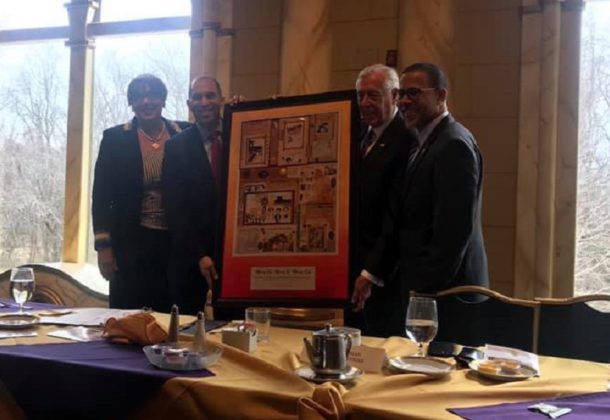Black Migration Is Subject of Breakfast Event

With a theme of Black Migration, the 38th annual Black History Month Breakfast hosted by Congressman Steny H. Hoyer was held Feb. 17, 2019. Congressman Hoyer was joined by keynote speaker Congressman Hakeem Jeffries (N.Y.-8th), chairman of the House Democratic Caucus; Congressman Anthony Brown (D- Md., 4th); and hundreds of Fifth District residents and community leaders.
Congressman Hoyer (D-Md., 5th) shared remarks about the importance of the annual breakfast, the topic, and Black History Month in general. He thanked Congressman Brown, for being a partner in hosting the 38th annual Black History Month breakfast.
“Each year’s Black History Month theme is deeply meaningful, and this one is very special indeed. Our 2019 theme of Black Migration recalls the arrival of the first people of African descent to what is now the United States,” Congressman Hoyer said in his prepared remarks. “We cannot forget the tragedy of those who were brought to Jamestown, Virginia, in chains – and the generations of suffering caused by the forced migration of Africans and their enslavement along with their descendants on this continent. That is the first migration we commemorate this year, one that was not one of choice.”
However, Congressman Hoyer and his colleagues also focused on another type of Black Migration, this time mostly of choice: the great migration of the early 20th century. At the 2018 breakfast, the group remembered the courageous African-Americans who served in the US and French militaries during the First World War, like the Harlem Hell-Fighters and the 450 African-American soldiers who hailed from Prince George’s County.
As those soldiers returned to their homes after the war, they realized they had seen another world, and one that was full of opportunities. Many of those soldiers were on the move. Some went back to France, where Paris became an expatriate enclave of African-American art and literature. A large number moved north, to the cities from which they had earlier embarked to the theater of war. After coming north, they were joined by their parents and siblings, spouses and children, and neighbors. It wasn’t long before cities in the North, Midwest, and West became hubs of African-American culture and entrepreneurship.
A golden emblem of this period was the Harlem Renaissance, when writers and thinkers like James Weldon Johnson and Zora Neale Hurston were redefining how African-Americans saw their history and their role in American life. Artists like Duke Ellington, Aaron Douglas, and Josephine Baker helped bring the beauty of black culture to wider audiences.
“It was an era of great migration and great change,” Congressman Hoyer said in his remarks. “African-Americans were on the move – not only opening new doors but opening minds. But all of these things were happening in an age where legal equality and full freedom were denied.”
Congressman Hoyer then began to speak about the influence on young minds by Dr. Martin Luther King Jr. King was born 90 years ago into an era where the children and grandchildren of the last enslaved Americans were reshaping this country’s culture. He saw firsthand the injustices he would later give his life to correct and he learned from giants upon whose shoulders he would stand, Congressman Hoyer said.
“Today, in 2019, we stand on Dr. King’s shoulders. But let us never forget the men and women who made his life and his struggle possible. As we make our way through a time of cultural and political transformation, I hope that we can look for inspiration to the great African-American leaders and cultural contributors of the early 20th century’s great migration as we seek to shape the twenty-first century as an age of equality, diversity, and progress,” Congressman Hoyer said.
Today, African-Americans are again on the move as drivers of 21st-century American culture and politics. New African-American members of Congress helped win a Democratic majority in the House, and are becoming committee chairs.
“They are leading powerful committees conducting oversight of the Trump administration and advancing legislation to expand opportunity, promote equal justice, and make our communities safer for all,” Congressman Hoyer said. The new committee chairs are: Chairman Bobby Scott of the Education and Labor Committee; Chairwoman Maxine Waters of the Financial Services Committee; Chairman Bennie Thompson of the Homeland Security Committee; Chairman Elijah Cummings of the Oversight and Reform Committee; and Chairwoman Eddie Bernice Johnson of the Science, Space, and Technology Committee.
Congressman Hoyer then introduced Congressman Hakeem Jeffries of New York, which covers parts of Brooklyn and Queens. Rep. Jeffries was elected to Congress in 2012. He served as co-chair of the Democratic Policy and Communications Committee during the last Congress and has now been chosen to lead the House Democratic Caucus.
Follow Congressman Hoyer on Facebook and Twitter.
For more information about House Majority Leader Steny H. Hoyer, visit his Leader Page.




















